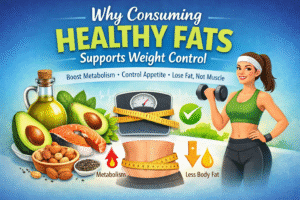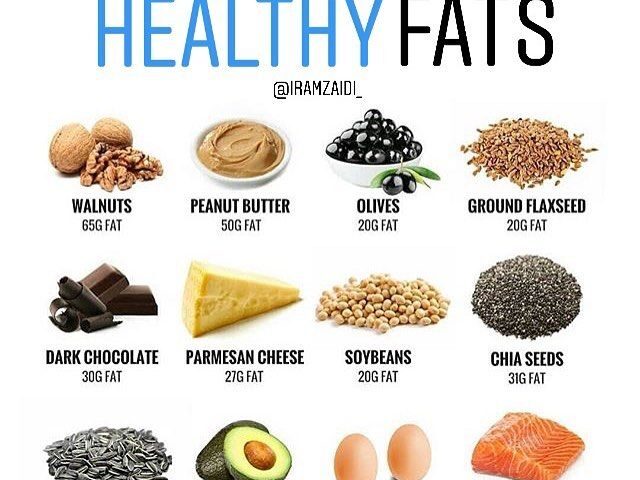
When we hear the word “fat,” many of us immediately think of weight gain or healthy problems. But not all fats are the same. The body actually needs certain types of fats, called healthy fats, to function properly. These good fats give energy, protect the heart, support the brain, and even help us maintain a healthy weight. In fact, nutrition experts now agree that consuming healthy fats supports weight control when done in the right way.
Why Consuming Healthy Fats Supports Weight Control:
What Are Healthy Fats?
Healthy fats are natural fats found in foods like nuts, seeds, fish, olive oil, and avocados. These are different from unhealthy fats such as fried oils, margarine, and packaged snacks. Healthy fats provide important nutrients, help absorb vitamins, and keep our body running smoothly. By making the smart choice toconsume healthy fats, we avoid the harmful effects of processed and deep-fried foods while still enjoying delicious meals that are good for weight control,to understand this article read this
Benefits of Whole Foods
How Consuming Healthy Fats Supports Weight Control?
Keeps Us Full for Longer
One of the main ways consuming healthy fats supports weight control is by keeping us satisfied after meals. Fats take longer to digest compared to simple sugars. This means we don’t feel hungry too quickly, and we avoid overeating or snacking on unhealthy foods.
Reduces Unnecessary Cravings:
When we eat balanced meals with healthy fats, our blood sugar remains stable. This stability reduces sudden hunger or cravings for sweets and junk food. In this way, consuming healthy fats supports weight control by making it easier to say no to extra calories.to understand this we are read this post
The Importance of balance diet
Boosts Metabolism:
Healthy fats improve how the body burns calories. Omega-3 fatty acids from fish, for example, are known to increase fat-burning processes. A better metabolism is one of the strongest reasons why consuming for gainig weight.
How Mint Helps Reduce Belly Fat and Boost Metabolism
Supports Energy Balance:
Healthy fats provide steady energy that lasts longer than sugary foods. When our body has a stable source of energy, we move more, stay active, and avoid fatigue. This active lifestyle also shows how consuming healthy fats supports weight control in daily life.
Mental Energy: Boost, Maintain, and Optimize Cognitive Power
Improves Hormone Balance:
Fats are important for producing hormones that control appetite, digestion, and metabolism. Without enough healthy fats, the body struggles with hormone imbalances, which may lead to overeating. Eating the right fats proves that on a deeper level.
https://www.uclahealth.org/news/article/eating-healthy-fats-has-many-benefits
Best Sources of Healthy Fats:
1. Avocados
Avocados are one of the richest plant sources of healthy fats. They contain monounsaturated fats that help lower bad cholesterol and improve heart health. Adding avocado to salads, sandwiches, or smoothies gives both taste and nutrition.
2. Nuts
Nuts like almonds, walnuts, cashews, and pistachios are full of, protein, and fibber. Eating a small handful daily can support weight control, improve brain function, and reduce heart disease risk.
3. Seeds
Chia seeds, flaxseeds, pumpkin seeds, and sunflower seeds are small but powerful. They are loaded with omega-3 fatty acids, which are among the most important healthy fats for reducing inflammation and supporting heart and brain health.
healthy fats
4. Olive Oil
Olive oil is one of the best cooking oils because it is rich in good fat . Using olive oil in cooking, salad dressing, or drizzling on food helps improve cholesterol levels and protect against heart problems.
5. Fatty Fish:
Fish like salmon, tuna, sardines, and mackerel are excellent sources of omega-3 fatty acids. These are very important for brain health, joint health, and lowering the risk of cardiovascular diseases.
6. Coconut and Coconut Oil:
Coconut contains medium-chain triglycerides (MCTs), a type of that provides quick energy and may help in weight management. Using coconut oil in moderation can be a good addition to a balanced diet.
7. Dark Chocolate:
Good-quality dark chocolate contains not only antioxidants but also super energy. Eating it in small amounts can improve mood, support heart health, and provide energy.
8. Eggs:
Egg yolks contain long with protein and important vitamins. They are especially good for brain and eye health when eaten in moderation.
9. Cheese:
Cheese, when eaten in balanced portions, provides protein and It also contains calcium for strong bones and teeth.
All these foods show practical ways in which consuming healthy fats supports weight control every day.
Healthy Fats vs. Unhealthy Fats:
Healthy Fats vs. Unhealthy Fats (Comparison Table)
| Feature | Healthy Fats | Unhealthy Fats |
|---|---|---|
| Main Types | Monounsaturated fats (MUFA), Polyunsaturated fats (PUFA), Omega-3 fatty acids | Trans fats, Excess saturated fats |
| Sources | Olive oil, avocado, nuts, seeds, fatty fish (salmon, tuna), flaxseeds | Fried foods, processed snacks, margarine, bakery items, fast food |
| Effect on Heart | Improve heart health, lower bad cholesterol (LDL) | Increase bad cholesterol (LDL), raise heart disease risk |
| Effect on Weight | Help control appetite and support healthy weight | May cause weight gain if consumed excessively |
| Inflammation | Reduce inflammation | Increase inflammation |
| Processing Level | Mostly natural and minimally processed | Highly processed and hydrogenated oils |
| Health Impact | Support brain, heart, and hormone health | Increase risk of obesity, diabetes, and heart disease |
Not all fats are equal. While healthy fats help in weight control, unhealthy fats do the opposite.
Healthy Fats
Avocado, nuts, fish, olive oil
Unhealthy Fats
Fried foods, processed oils, margarine, junk snacks.
Healthy Fats vs. Unhealthy Fats
What Are Healthy Fats?
Healthy fats are the types of fats that support our body’s energy, brain function, and heart health. They improve cholesterol balance, reduce inflammation, and help our body absorb vitamins. Examples include omega-3 fatty acids, monounsaturated fats, and polyunsaturated fats.
Examples of Healthy Fats:
Avocados
rich in monounsaturated fats.
Nuts and seeds
good sources of omega-3 and fibber.
Olive oil
lowers bad cholesterol and supports heart health.
Fatty fish
(salmon, tuna, sardines) – high in omega-3 fatty acids.
Eggs and cheese
(in moderation) – provide protein and healthy fats.these healthy fats
are essential for a strong heart, sharp memory, balanced hormones, and even weight control.
What Are Unhealthy Fats?
Unhealthy fats are harmful to our body when consumed in excess. They increase bad cholesterol, raise the risk of heart disease, and lead to weight gain. The two main types are trans fats and excess saturated fats.
Examples of Unhealthy Fats:
Trans fats found in fried foods, packaged snacks, and processed baked goods.
Excess saturated fats from processed meats (sausages, bacon) and too much butter.
Fast foods like burgers, fries, and pizzas often contain high amounts of unhealthy fats..
Key Differences between Healthy Fats and Unhealthy Fats:
| Aspect | Healthy Fats | Unhealthy Fats |
| Effect on Heart | Protects heart health | Increases heart disease risk |
| Cholesterol | Raises good cholesterol (HDL) | Raises bad cholesterol (LDL) |
| Sources | Avocados, nuts, olive oil, fish | Fried foods, processed snacks, fast food |
| Body Energy | Provides long-lasting energy | Leads to fatigue and weight gain |
| Inflammation | Reduces inflammation | Increases inflammation |
Why Choose Healthy Fats Over Unhealthy Fats?
Choosing healthy fats helps in:
healthy fats
Better weight control.
Reduced risk of diabetes and heart disease.
Improved brain power and memory.
Stronger immunity and better mood.
On the other hand, too many unhealthy fats can shorten life expectancy and cause lifestyle diseases.
Tips to Consume Healthy Fats the Right Way:
Replace Unhealthy Fats with Healthy Fats
Instead of deep-fried snacks or fast food, try replacing them with healthier choices. For example:
Use olive oil instead of butter for cooking.
Snack on almonds or walnuts instead of chips.
Choose grilled fish instead of fried meat.
This swap makes a big difference in long-term health.
Add Healthy Fats to Every Meal
A smart way to consume is by spreading them across meals:
Add chia or flax seeds to smoothies or yogurt.
Drizzle olive oil on salads.
Eat eggs or salmon for breakfast.
This helps in better digestion and keeps energy levels steady throughout the day.
Cook Smartly with Healthy Oils
Cooking oils are one of the main sources of fat in our diet. Choose oils that are rich in, such as olive oil, canola oil, or avocado oil. Avoid reheating oils too many times, as it can damage their nutrients.
Combine Healthy Fats with Other Nutrients
Healthy eating is about balance. Pair lean proteins and complex carbs. For example, avocado toast with whole-grain bread and eggs makes a balanced meal. This improves nutrient absorption and keeps us satisfied for longer.
Watch Out for Hidden Unhealthy Fats
Some foods may claim to be “healthy” but still contain trans fats or excess saturated fats. Always check food labels to avoid processed snacks, fried items, or baked goods with unhealthy oils. Stick to fresh, natural sources for
healthy fats.
Include Omega-3 Rich Foods
Omega-3 fatty acids are one of the most powerful for brain, heart, and joint health. We can include fish like salmon, sardines, and tuna, or plant-based sources like chia seeds, flax seeds, and walnuts.
Eat Mindfully
Eating should be part of a mindful eating habit. Chew slowly, enjoy the taste, and avoid overeating. This simple practice supports better digestion and weight control
.Loving Good Food: A Simple Guide to Eating Mindfully
Make Healthy Fats a Daily Habit
Consistency is the key. By including small amounts of in our daily meals, we protect our heart, brain, and overall health naturally.
Weight control is not only about eating less—it’s about eating right. By adding good sources of fats to our meals, we give the body energy, improve metabolism, and stay full longer. Instead of fearing fats, we should welcome the right ones. This is why consuming healthy fats supports weight control and leads to a healthier life overall.
consuming healthy fats supports weight control
FAQ About Consuming Healthy Fats:
Do healthy fats really help with weight loss?
Yes, consuming healthy fats supports weight control by reducing hunger and boosting metabolism.
Which healthy fats are best for daily eating?
Avocados, olive oil, nuts, seeds, and fish are the best sources.
Can I gain weight by eating too many healthy fats?
Yes, too much of any food can cause weight gain. Balance is important.
How often should I eat foods with healthy fats?
Including small amounts daily is enough for most people.
Are healthy fats safe for the heart?
Yes, they lower bad cholesterol and improve heart health.

